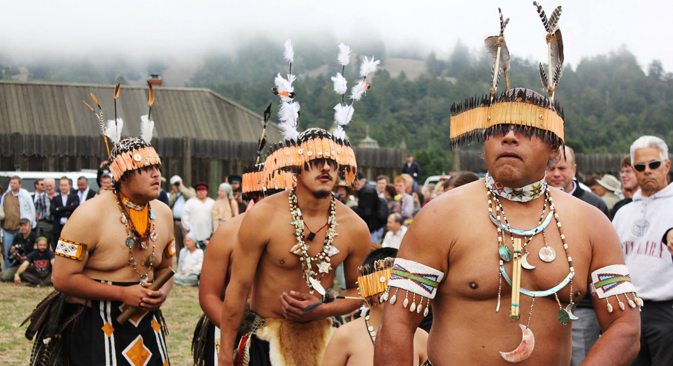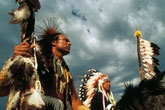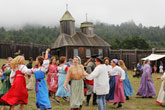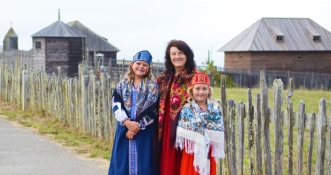Discovering a shared history

From 1812 to 1841, Russians, Native Alaskan Aleuts, and the Kashaya Pomo shared the land that Russian explorers called Fort Ross. Source: Elena Bobrova
On June 21, Su-Nu-Nu Shinal, a small dance troupe of the Kashaya Pomo Band of Native Americans, will travel to Russia to perform.
The trip will not be just a performance tour – the Kashaya have a history with Russia that began when Russian explorers settled the California coast in the early 19th century.
From 1812 to 1841, Russians, Native Alaskan Aleuts, and the Kashaya Pomo shared the land known as Fort Ross. That land, known to the Kashaya as Metini, is a reminder of Russian presence on North American soil.
In September 2012, the year that Fort Ross celebrated its 200th anniversary, a delegation from Northern California that included members of the Kashaya Pomo and Coast Miwok tribes traveled to Moscow, St. Petersburg and the Vologda Region town of Totma to commemorate two centuries of shared history.
In St. Petersburg, the group visited the Kunstkamera museum, which has hundreds of Kashaya artifacts on display. Yuri Berezkin, the curator of Coast Miwok and Kashaya artifacts at the Kunstkamera, received the delegation at the museum. Berezkin said that after meeting the people whose ancestors had made the jewelry and baskets in the collection he “would never see the objects the same way again.”
“It is essential for the Kunstkamera to hear the Kashaya’s comments about the origins and affiliations of the artifacts,” Berezkin said.
The visit was significant for the Americans as well. When Kashaya tribal member Martina Morgan saw the artifacts for the first time, particularly the baskets, she said, “it felt like I had just seen someone that had been away from home for a really long time. Our people believe that when we make something, our spirit, thoughts and feelings go into that basket. So when we hold them, we can feel their energy.”
The Russian Ministry of Foreign Affairs has taken a particular interest in the Kashaya’s historical relationship with Russia, and is financing a large part of Su-Nu-Nu Shinal‘s upcoming trip, along with the Renova-Fort Ross Foundation. Vladimir Vinokurov, Russia’s Consul General in San Francisco who was the Deputy Director of the North American Department at the Ministry of Foreign Affairs at the time of the 2012 trip, played a critical role in initiating the relationship. Robin Joy Wellman, a California State Park interpretive specialist at Fort Ross, said that Vinokurov played an important role in promoting cross-cultural ties on the Russian side.
“In the eyes of many Russians, it was unclear why it was important to pursue a connection with the Kashaya,” Wellman said. “Vladimir Vinokurov helped everyone understand that a strong relationship today is hugely important. It is unheard of for a native people to reach out to someone that was on their land, but the Kashaya wanted to. Gradually, the doors are opening for the Russians and Kashaya to be brought into each other’s world.”
The Kashaya believe that when the Russian-American Company departed Fort Ross, many members of their tribe went back to Russia. For that reason, they look forward to the trip in June to continue building the relationship, particularly among younger people.
Su-Nu-Nu Shinal‘s first dance performance will be at the Jewish Center of Tolerance in Moscow. Dancer and Kashaya tribal member Billyrene Pinola is particularly interested in sharing the Kashaya’s story there, because, as she said, “despite the fact that we are from different parts of the world, we have had the same struggles. There will always be a peaceful relationship, no matter how far apart we live. It is important to tell our history and our stories from our own mouths. Now that I know our history is connected, I feel like we’re related, like they’re another tribe. Wherever our people have walked, there will be a connection in my heart and in Russia.”
Former Kashaya Tribal Chair and native Coast Miwok Lester Pinola said that political disagreements between Russia and the U.S. had no effect on the way his tribe feels about the country.
“No one in Washington ever invited us anywhere, but in Russia we are welcomed with open arms and they treat us as equals. I never saw the bad side of Russia. There is no animosity against us because we are from the United States, and more Americans need to know these people the way that we have. We are thankful for the help and support to show our culture, and to teach our youth that you must see things firsthand and live with the memories of the experience. We hope that the doors will open to them to travel back and forth,” Pinola said.
Fort Ross: Memories of the future>>>
All rights reserved by Rossiyskaya Gazeta.
Subscribe
to our newsletter!
Get the week's best stories straight to your inbox


